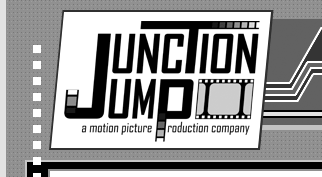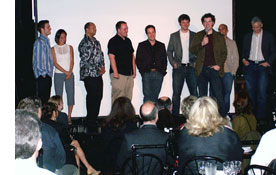

 JASON C. TYRRELL — A DIRECTOR'S JOURNEY
JASON C. TYRRELL — A DIRECTOR'S JOURNEY
![]()
Hello there, superhighway speedracer! This is Jason C. Tyrrell, the writer/director of Tubes, the debut feature-length film from Junction Jump.
Over the next year-plus, I will attempt to give you an inside look into the process of bringing an independent film to screen. Because of the blood, sweat and tears that are usually poured into a low-budget indie feature to see it come to life, I make no promises of maintaining any sort of coherence, composure or calm calculation in my communications. Or of ever again using that many "C"-words in a sentence. But I do promise honesty and hopefully, when all the cards have been played, some big-picture insight. And as a record of success, failure, and dreams fulfilled, may it be some solace to me when the journey to complete and distribute Tubes draws to a close, and I'm sitting back in my easy chair, scratching my head, wondering where the hell all my hair went.
Enjoy!
— Jason C. Tyrrell, November 18th, 2006
Table of Contents
![]()
3/8/2007 — Entry #6: The Businessman Does the Business
2/18/07 — Entry #5: The Love/Hate Relationship
1/22/07 — Entry #4: The Act of Creation
1/7/07 — Entry #3: The Trap of Significance
11/26/06 — Entry #2: giving thanks, and the reawakening of the pulse...
11/19/06 — Entry #1: weddings, funerals, rewrites...
11/19/06 — Entry #1: weddings, funerals, rewrites...
![]()
Everything happens for a reason.
This week was a massive culmination, the end of a few long pages, nay, a whole chapter, in the cosmic encyclopedia. I shot my last two freelance video production gigs of the year, an awards dinner and a wedding. Fairly unremarkable, except for the fact that it was more work out of the way of the freight train that is Tubes. And on the heels of this, I experienced three deaths at nearly the same time: my good buddy's 101-year-old grandmother (a proud, pit bull of a woman who probably could've kicked my ass), my brother-in-law's older brother (not old enough that it was easy), and the latest draft of the Tubes screenplay. The first two were regrettably strangers, known by reputation and predicament. The third was our baby.
 Writing is kinda like being part of a crotchety married couple. And the screenplays are our babies. There are times you're the coddling and sensitive mama, cooing that baby to sleep at night, applauding the characters, themes and symbols so delicately crafted, like its first watercolor at back-to-school night. Or you're the demanding pops, poking and prodding that baby's every loose string and shortcoming like a Little Leaguer's worst nightmare. Together, Jon and I are a pretty good team, ferreting out issues, telling the best story we can, the story that's IN THERE, to be revealed.
Writing is kinda like being part of a crotchety married couple. And the screenplays are our babies. There are times you're the coddling and sensitive mama, cooing that baby to sleep at night, applauding the characters, themes and symbols so delicately crafted, like its first watercolor at back-to-school night. Or you're the demanding pops, poking and prodding that baby's every loose string and shortcoming like a Little Leaguer's worst nightmare. Together, Jon and I are a pretty good team, ferreting out issues, telling the best story we can, the story that's IN THERE, to be revealed.
And yet here we are, two and a half months before production, talking about the script. I have to keep reminding myself that the script is only a blue print...one that changes even in the editing room. We know the characters, we know the story, the movie we're looking to bring to screen, something we all can be proud of. But some of the folks who've submitted themselves to a read and critique, otherwise intelligent, even-keeled people, are just not seeing what we see. In other words, they're not getting the story. That would more than qualify the screenplay as currently without a pulse. And it's our job to find it again. The magic of it, the beauty and the chaos of the whole shebang, is that there's no guidebook, no "however-many-stepped process," as our Engineer would say, to lead us out of the darkness. I tried on a Zen, yet fabulously ballsy perspective. Jon's thoughts were of sheer panic.
And then the other deaths happened, the actual deaths, not just temporary setbacks, but full and complete transitions to the great unknown, the big, dark, next thing. I went to funerals, mourned and celebrated Helen Ryder and Donald Welch with family and friends. And besides the satisfaction of being there for people who are important to you, being able to help in whatever small way to ease their pain, these passings also injected a good deal of needed perspective. The priest at Mass spoke of death not as an ending, but as a transition. As he spoke I pictured a set of double doors opening through a wall of earth and sand, a shower of pebbles and earthworms raining down through the exposed air. I thought about the transfer of energy back and forth into the universe. What you put out, you get back in return. I thought about the transiency of life. How some years pass in a blink, yet some days seem to last forever. And that's why you smile, after the tears are gone. You remember, just in the nick of time.
I'm still here. And I won't rest until this movie is made.
Welcome to Tubes.
11/26/06 — Entry #2: giving thanks, and the reawakening of the pulse...
![]()
 This week, I put my freedom, my very American-ness, to the best of use. I ate myself into near oblivion alongside some of my favorite people in the world. I know there are a lot of problems in the world, but I think most of them would disappear if every family in God's creation was given a Thanksgiving dinner with all the trimmings and a couch. For this, for my family, my friends, and my Shih Tzu, I give unending thanks.
This week, I put my freedom, my very American-ness, to the best of use. I ate myself into near oblivion alongside some of my favorite people in the world. I know there are a lot of problems in the world, but I think most of them would disappear if every family in God's creation was given a Thanksgiving dinner with all the trimmings and a couch. For this, for my family, my friends, and my Shih Tzu, I give unending thanks.
I also give thanks for computers, and very especially for the "delete" key, which allows you to banish mediocre work into the ether with barely a tear shed. This week, Jon and I attacked the Tubes screenplay with Hannibal-Lecter-like gusto, killing off uninspired scenes, serving them up with fava beans and a nice chianti. And you know what? Continuing to rewrite makes a script much, much better. I've been writing for sixteen years, and I'm still learning. Question everything. Question and question again. Especially if you like something, but don't love it. There is no room anymore for half-measures and semi-sentiments. Not for the characters, absolutely not for the filmmakers.
So I am happy to announce that the script has moved away from the light, and rejoined us on the earthly plain. And without a moment to lose. I eagerly watch the days pass, beg the calendar to hurry its move into winter, the winter of production, and yet keenly feel that we're behind the eight ball.
We should absolutely have X and Y and Z completely locked up by now!
We're never going to make it if Q and V and C don't get handled in the next two days!
If C and I and A aren't given yadda yadda days of prep time, we're all DOA!!
I know these statements to be definitively true. I also know that I don't know anything. Given these two unhelpful and conflicted perspectives, panic threatens at the end of most days. I keep that panic at bay with the knowledge that I'm surrounded by a very talented, supportive, and committed team. Not just with Junction Jump, but in life. And, equally important, I love this movie. Not a frame has been shot, not a role has been cast, but after the panic recedes and the excitement – the thankfulness – returns, I see Tubes screening on the inside of my eyelids, for an audience of one. And man, it's good!
1/7/07 — Entry #3: The Trap of Significance
![]()
What is the purpose of film? Is it to learn something about yourself or the human condition? Is it to be entertained, to take two hours out of your life and completely forget any stresses and problems? If your passion is the documentary, than you'd probably answer that it's the former. If you wait all year for Hollywood's summer slew of event films, than you'd surely say the latter. The answer probably lies somewhere in between. But I find that as my own tastes waver back and forth between those poles, so do my choices for the direction of Tubes.
 Tubes is most definitely a movie with a message, but it isn't a "Message Movie." And I sometimes struggle with those distinctions. As a writer, your job is to deliver a message without broadcasting that you're trying to do anything. As a filmmaker pitching a project in development, your job is to specifically describe what it is you're trying to do, and it had better be good. And regardless of which hat you're wearing, your job is to make a movie that sells. How to do it all?
Tubes is most definitely a movie with a message, but it isn't a "Message Movie." And I sometimes struggle with those distinctions. As a writer, your job is to deliver a message without broadcasting that you're trying to do anything. As a filmmaker pitching a project in development, your job is to specifically describe what it is you're trying to do, and it had better be good. And regardless of which hat you're wearing, your job is to make a movie that sells. How to do it all?
It seems that many times independent filmmakers get stuck in the trap of significance, where it's all or nothing. I know it's always been important to me to make films that serve a purpose, that contribute to the betterment of society in some way. But I also know that my favorite moments in filmmaking really have nothing to do with that. The best part of the process for me is the collaboration — joining together with a diverse group of people in the creation of something new, something that none of us could create alone. And as a film fan, my favorite films are always great, ripping yarns. Being engaged by a story always trumps any concerns I have about learning anything or making any sort of difference. That's what brought me here. When I was ten, making up an on-the-fly "Choose Your Own Adventure" for my buddies wasn't about teaching or enlightening. It was about the looks on their faces, seeing them caught up in a journey they weren't expecting and didn't quite prepare for, caring about characters they'd never met, who in fact didn't even exist.
This is what I go back to, in the moments when I find myself getting too significant about the significance of Tubes. The message of the film is clear, and every time I speak about it I find myself more passionate and committed to seeing it expressed to a large audience. But what's most important to me is drawing folks into an adventure, our own ripping yarn, one that's never been experienced before. And the fun of that is so much greater that delivering a message. That fun becomes the message. And since Tubes deals so heavily with personal responsibility, it's time I took responsibility for that.
1/22/07 — Entry #4: The Act of Creation
![]()
 This week, we're scheduled to have the first table read of the script. A handful of actors, the Cinematographer (that crazy guy who likes to write about film stock), the Producer, a few other folks we're pretending are impartial and I will sit around a big table in a small room that's either too hot or too cold and run through the script from end to end. For me, it'll be the first time in months that the script will be completely out of my head, and all there will be to do is listen. And it comes not a moment too soon.
This week, we're scheduled to have the first table read of the script. A handful of actors, the Cinematographer (that crazy guy who likes to write about film stock), the Producer, a few other folks we're pretending are impartial and I will sit around a big table in a small room that's either too hot or too cold and run through the script from end to end. For me, it'll be the first time in months that the script will be completely out of my head, and all there will be to do is listen. And it comes not a moment too soon.
When you've spent many long hours and days deep in the psyche of your characters, willing it all to work while simultaneously forcing yourself out of their way (letting the characters breathe, so to speak), there comes an inevitable point when perspective fades like a distant, drink-addled memory. So to have other people inhabit that world, to sit back and just be a spectator, is the best way to get that perspective back. (Hell, there's a reason both words have got "spec" in 'em!) Then the script truly will have its own life, for better or worse, and I'll get to be a witness to its first, tentative breaths. And that's not even the best part...I'm gonna tape it.
Just like the proud yet inane daddy-to-be thrusting a camcorder into his wife's sweaty, murder-filled face for the Hour 34 Update of Delivery: The Movie, I'm out to relive this moment again and again until the end of time. For better or worse, I am not satisfied to just take it in, experience it in the present and then let it go; I want to delve deeper, to break it down, to extract the experience from the comfy confines of the live performance and see how it stands up to review. And as audio alone, without the crutch of an actor's face or natural charisma, how will it fare? Am I interested? Do I buy it?
Wow...I have to admit that, written out like this, the whole thing sounds painful. Like I'm less the blissfully-cheery father and more the sweaty one doing the pushing! This could be agony! What if it doesn't work? What if they don't like it!? Why would anyone choose this sort of pain!?
Because the act of creation is worth it. And beneath that sort of base panic, that unavoidable artist-working-in-a-business fear of what they'll think, I know we have a good movie on our hands. But in order to make it great, I have to let it go, to open it up to the world, for better or worse, and let it breathe.
If you want to be a cameraman, go be a cameraman. There are hundreds of networks with stables of reality TV stars who don't mind how poorly you light them. If you can't handle it, shoot a local access show — you'll never have to worry about who's watching. If you want to be a writer, go be a writer. The Internet is a gap-mawed Blog-beast, voraciously feeding on words — and there's truly no end to its appetite. If you can't handle it, write your stories in wide-ruled notebooks you can bury in the backyard.
But if you have a delicate ego, don't make movies. There are people who will love them and people who will hate them, and they'll have absolutely no qualms about telling you which group they're in.
You could always bury your movie in the backyard, but film canisters and digital tape are not biodegradable. And you wouldn't want Al Gore on your ass, would you?
2/18/07 — Entry #5: The Love/Hate Relationship
![]()
Recently I was having a conversation with a filmmaker friend of mine. He's a little older, a litter wiser, and he's managed to follow his dreams and a paycheck at the same time. He's got a great job, a family and a creative career. He's made his peace with the youthful pursuit of "fame" and is content to live a life he loves. I was on the phone with him looking for advice. And in a way, that was the advice. Something like, "Love what you're doing, man...film, telling stories, you just gotta love it. That's what it's about." And I do. I love it. Except when I hate it.
 The past month has been one of progress and velocity. We're gearing up for a spring/early-summer production, come Hell or high water (and from what I hear about the Panhandle in May and June, it might feel much like eternal burning damnation, at least at high noon). We've continued to make contacts, courting more and more support from financial, marketing, PR and creative people. We've trimmed the fat without a glance back, letting go of people who either didn't get it or weren't up to the challenge of Tubes. There's nothing we've been too squeamish to take on when it comes to getting the film made, no job too big or small, no task too daunting, no hands left unshaken or cheeks left unkissed (minds out of the gutter, folks...). And yet, there's ever so much more to do. Hence the hate.
The past month has been one of progress and velocity. We're gearing up for a spring/early-summer production, come Hell or high water (and from what I hear about the Panhandle in May and June, it might feel much like eternal burning damnation, at least at high noon). We've continued to make contacts, courting more and more support from financial, marketing, PR and creative people. We've trimmed the fat without a glance back, letting go of people who either didn't get it or weren't up to the challenge of Tubes. There's nothing we've been too squeamish to take on when it comes to getting the film made, no job too big or small, no task too daunting, no hands left unshaken or cheeks left unkissed (minds out of the gutter, folks...). And yet, there's ever so much more to do. Hence the hate.
I JUST WANNA MAKE THE FRIGGIN' MOVIE!! Okay...okay, I'm alright now...wow, that felt good. You have to understand just how frustrating this can be sometimes. There's nothing more satisfying than wrapping someone up in a good story. I've experienced it many times before. As an actor, you can rehearse for weeks or months. Then it's showtime, and you're working through a particularly good piece, maybe Bill Shakespeare or Dave Mamet. You gaze out past the lights and see the rapture on people's faces and know, "I've got them. They're hooked." As a writer, maybe you slave over a short story for as long or longer. But then you give it over, the gracious readers pore over it in their favorite chairs and then call you to either gush or stammer. But when it works, there's no way for them to hide the story's impact on them. It's all over their flushed cheeks, their wide eyes or their expressionless battle to come back to reality. And then you know, "Yeah, I did it. They're hooked."
Film, especially on the independent level, is so different. You slave over the screenplay as long or longer than any other form. Some scribes take more time to pen their screenplays than to write a novel! But at the end of the process, all you've got is a blueprint. The best scenario is that the intelligent screenplay reader can glimpse the potential of the final film, as long as what you've written is not only strong, but also mainstream enough to be easily understood. So many qualifiers! And you're still only on Step One.
 You've got to find the money, to convince one or a hundred or a thousand folks, who have every reason in the world not to believe you and probably ten million simpler ways to spend their cash, to give it over on the strength of your vision – your WORD – that that powerful, caught-up-in-the-story moment is just around the corner. Then you've got to find a cast to get on board with that vision and agree to work for what's generally a fraction of their usual wage. Crew as well, which can sometimes be an even bigger task. Think about it — a good actor can sometimes shine even in a bad movie led by an atrocious director. But how many folks are gonna watch a stinker and say "Damn, that movie blew vicious chunks, but didja check out the work of that gaffer!?" Then there are locations, equipment, schedule, technique, lighting, sound, weather, unions, people getting sick, or drunk, or falling in love with each other and disappearing in mid-shoot, or hating each other and attempting sabotage. There are the edit, and the mix, and the lab, which could destroy days of exposed film with no warning. There are film festivals, and distribution, and lawyers, and insurance, and the navigation of contracts and repayment schedules and the ratings board, and...you get the picture.
You've got to find the money, to convince one or a hundred or a thousand folks, who have every reason in the world not to believe you and probably ten million simpler ways to spend their cash, to give it over on the strength of your vision – your WORD – that that powerful, caught-up-in-the-story moment is just around the corner. Then you've got to find a cast to get on board with that vision and agree to work for what's generally a fraction of their usual wage. Crew as well, which can sometimes be an even bigger task. Think about it — a good actor can sometimes shine even in a bad movie led by an atrocious director. But how many folks are gonna watch a stinker and say "Damn, that movie blew vicious chunks, but didja check out the work of that gaffer!?" Then there are locations, equipment, schedule, technique, lighting, sound, weather, unions, people getting sick, or drunk, or falling in love with each other and disappearing in mid-shoot, or hating each other and attempting sabotage. There are the edit, and the mix, and the lab, which could destroy days of exposed film with no warning. There are film festivals, and distribution, and lawyers, and insurance, and the navigation of contracts and repayment schedules and the ratings board, and...you get the picture.
Jon and I first had the idea for Tubes sometime in the neighborhood of November, 2005. If all goes well, our film will be complete and screening just under two years later. With fifteen months of work behind us, we've still got the lion's share ahead and many many many weeks and days and months until we have a shot at that moment, a chance to place a story in the hands of an audience, and hook them.
If I could plug a cable into my brain, like Keanu in The Matrix, and tap it into Joe Moviegoer, so he could see the Tubes I see, maybe I wouldn't have such a bipolar relationship to the process. Then again, if it were that simple, would it even be worth the attempt? I guess, in the end, the look on the faces in the audience isn't really them being hooked in to what I want them to see; they are hooked into their own unique visions of the story, the story that a group of people who refused to give up have told. It's the look of newness; of innocence and connection and feeling and relationship. It's the unadulterated experience of being alive. And that's worth getting over any amount of frustration or struggle or hate. That's love.
3/8/2007 — Entry #6: The Businessman Does the Business
![]()
 The last couple weeks have been chock full of impactful work. I've made scores of phone calls, written dozens of e-mails, sent gads of smoke signals, carrier pigeons, etc. — and have made some nice headway. We've found a fantastic cinematographer for Jon to pass the torch to, now that he's taken the reins as our creative producer. We've made inroads with a few very promising investors/executive producers, including securing the opportunity to pitch a huge group out in California later this month. We've balanced fundraising, locating additional crew, gathering leads for casting and continuing the creative development of Tubes (check out the website and our MySpace page for new images by artist Dave DeMaio). It's been exhilarating seeing the project continue to take shape and grow beyond my expectations. But at the same time, man...the slog of it all. These are the moments when it's easy for discouragement to bloom. I mean, it's just so hard...
The last couple weeks have been chock full of impactful work. I've made scores of phone calls, written dozens of e-mails, sent gads of smoke signals, carrier pigeons, etc. — and have made some nice headway. We've found a fantastic cinematographer for Jon to pass the torch to, now that he's taken the reins as our creative producer. We've made inroads with a few very promising investors/executive producers, including securing the opportunity to pitch a huge group out in California later this month. We've balanced fundraising, locating additional crew, gathering leads for casting and continuing the creative development of Tubes (check out the website and our MySpace page for new images by artist Dave DeMaio). It's been exhilarating seeing the project continue to take shape and grow beyond my expectations. But at the same time, man...the slog of it all. These are the moments when it's easy for discouragement to bloom. I mean, it's just so hard...
But it's then that I have to remind myself...the businessman does the business. It ain't the Film Party, it's the Film Business. Any movie that costs more than you can toss on your credit card inevitably gets made or not by how you handle the business end. Many writer/directors wish they could ignore this fact, but you can't. There are probably scores of genius works that will never see celluloid because of the filmmakers' inability to handle their business. And one of the things I'm most proud of is how Junction Jump has grown as a company – as a business venture – throughout this process. The work continues, and hard or easy, it will continue on until I'm sitting on my rear, watching Tubes on cable. As long as we stay determined, Tubes will happen. And I'll tell ya, with the folks we've got involved in this baby, it's gonna be some crazy business...
